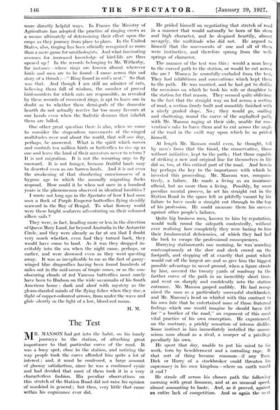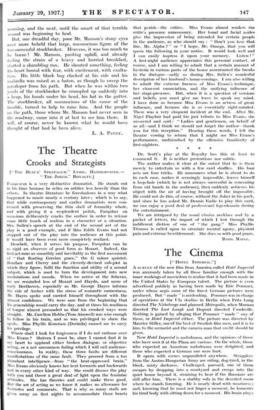The Test
MR. MANSON had got into the habit, on his lonely journeys to the station, of attaching great importance to that particular curve of the road. It was a busy spot, close to the station, and noticing the way people took the curve afforded him quite a lot of interest ; and, it must be confessed, a large amount of gloomy satisfaction, since he was a confirmed cynic and had decided that most of them took it in a very characterless fashion. His peculiar observations on this stretch of the Station Road did not raise his opinion of mankind in general ; but then, very little that came within his cognizance ever did. He prided himself on negotiating that stretch of road in a manner that would naturally be born of his stern and high character, and he despised heartily, almost savagely, the multitude who did not. He argued to himself that the movements of one and all of them were instinctive, and therefore sprang from the well- springs of character.
The manner of the test was this : would a man keep to the curved path to the station, or would he cut across the arc ? Women he scornfully excluded from the test. They had inhibitions and conventions which kept them to the path. He was married, and he had got to dislike the occasions on which he took his wife or daughter to the station for that reason. They seemed quite oblivious to the fact that the straight way on led across a section of road, a section firmly built and smoothly finished with a nicely graded slope. No ; they would go, smiling and chattering, round the curve of the asphalted path, with Mr. Manson raging at their side, unable for con- vention's sake to leave them and to cut across the angle of the road in the swift way upon which he so prided himself.
At length Mr. Manson could even, he thought, tell by men's faces that the timid, the conservative, those without initiative, kept to the path ; that those capable of striking a new and original line for themselves in life did so, too, at this critical part of the road. And herein lay perhaps the key to the importance with which he invested this proceeding. Mr. Manson was, compara- tively, a failure. He made a living as an insurance official, but no more than a living. Possibly, by some peculiar mental process, he set his straight cut in the Station Road in the space left so pitifully vacant by his failure to have made a straight cut through to, the top of his profession. He could measure there his success against other people's failures.
Quite big business men, known to him by reputation, would walk round the sidepath contentedly, without ever realizing how completely they were baring to him their fundamental deficiencies, of which they had had the luck to escape the professional consequences.
Hurrying stationwards one morning, he was' scowling contemptuously at the slow and sleek crowd on the footpath, and stepping off at exactly that point which would cut off the largest arc and so give him the biggest possible advantage in saved ground, when a figure strode by him, covered the twenty yards of roadWay to the farther curve of the path in an incredibly short time, and went on sharply and confidently into the station entrance. Mr. Manson gasped audibly. He had recog- nized the man as a particularly successful stockbroker, and Mr. Manson's head so whirled with this contrast to his own fate that he entertained none of those fraternal feelings which one would imagine he should have felt for " a brother of the road," an exponent of this most vital practice of his own conception. He experienced, on the contrary, a prickly sensation of intense dislike. Some instinct in him immediately installed the. uncon- scious man ahead as a rival, a usurper of a privilege peculiarly his own.
He spent that day, unable to put his mind to his work, torn by bewilderment and a corroding rage. If that sort of thing became common—if any Toni, Dick or Harry of a stockbroker could threaten his supremacy in his own kingdom—where on earth would it end ?
He strode off across his chosen path the following morning with great firmness, and at an unusual speed, almost amounting to haste. And, as it proved, against an entire lack of competition. And so again the next. morning, and the next, until the smart of that terrible wound was beginning to heal.
But, one dreadful day, poor Mr. Manson's stony eyes once more beheld that large, unconscious figure of the too-successful stockbroker. Heavens, it was too much to be borne ! Mr. Manson, panting uphill, and already feeling the strain of a heavy and hurried breakfast, started a shambling run. He shouted something, feeling his heart bound with fear, with excitement, with exalta- tion. His little black bag clacked at his side and his umbrella was raised as a baton, as though to sweep the interloper from his path. But when he was within two yards of the stockbroker he crumpled up suddenly into a heap, his hands under his head, his hat in the gutter. The stockbroker, all unconscious of the cause of the trouble, turned to help to raise him. And the people on the path, those whom Mr. Manson had never seen in the roadway, came into it at last to see him there. It will, of course, never be known what he would have thought of that had he been alive.
L. A. PAVEY.







































 Previous page
Previous page